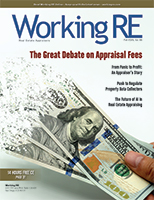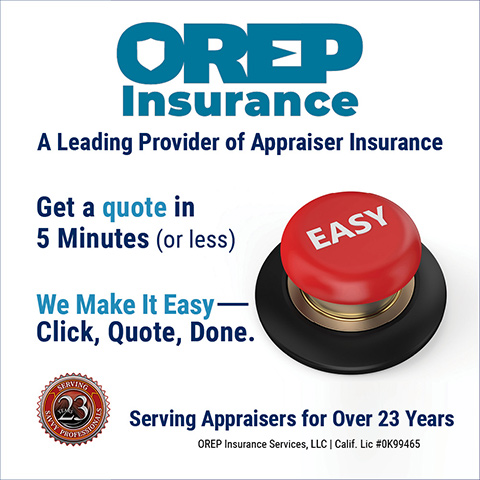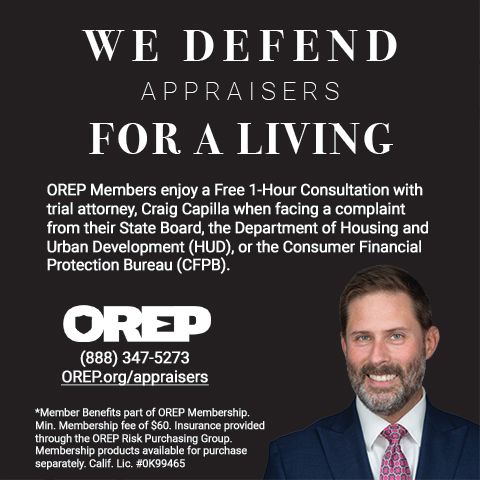 |
> The Appraiser Coach
> OREP E&O |
TAF Under Pressure: New President Takes the Reins
by Tony Jones, Senior Editor
After more than three decades under the leadership of David Bunton, The Appraisal Foundation (TAF) has a new president. But the appointment of Kelly Davids wasn’t without controversy. With a hot lens on the appraisal profession in general, particularly regarding charges of bias and discrimination, some government and industry observers saw the transition to a new president as an opportunity for the foundation to bring in some fresh blood and an outside perspective at the top—until it didn’t.
Davids’ ascension as an internal candidate from her position as senior vice president is not particularly unusual since she was already serving in a chief operating officer role and had been on staff with TAF since 2013 as well as a member of the Board of Trustees (BOT) for about a year and half prior to that. But her hiring in March still raised eyebrows in part because it came at the conclusion of a search process that began in 2022 after Bunton informed the BOT that he would retire when his contract expires at the end of this year.
As part of that process, the BOT brought in a search firm, Association Strategies Inc. (ASI), to interview stakeholders, including the Appraisal Subcommittee—the federal agency that monitors and reviews TAF’s work— board members and staff, to “develop a candidate profile to identify the next organization president,” according to a TAF press release. Then, in July 2023, the BOT’s CEO Search Committee “decided to pursue an internal candidate search first to determine if any candidates met the criteria laid out in ASI’s candidate profile.”
The internal search identified Davids, who was unanimously advanced as the committee’s recommendation, following “background and reference checks, three rounds of interviews and a presentation,” according to TAF.
Among the detractors of the search process was Rohit Chopra, director of the Consumer Financial Protection Bureau and designated executive sponsor for the Appraisal Subcommittee (ASC) of the Federal Financial Institutions Examination Council. During a hearing before the ASC about a week before Davids was named president, Chopra gave a harsh, wide-ranging critique of TAF including what he characterized as a lack of transparency in its processes.
Regarding the president search, Chopra indicated that the ASC members who participated in the search firm’s exercise to develop a candidate profile had “stressed the importance of a broad search that included consideration of external candidates.” He also testified that TAF hadn’t given the ASC “access to deliberations or any role in reviewing candidates” and referred to an earlier hearing in which Bunton “opined that The Appraisal Foundation would not seek ratification of its new president from the ASC.”
“The Appraisal Foundation’s failure to fully disclose basic details or meaningfully involve the ASC in this process gives no reason to be confident in the leadership selection process,” Chopra told the subcommittee.
Welcome Aboard
In fairness to Davids, she wasn’t in control of any part of the process. Other than participating in the staff interviews that ASI used to craft a candidate profile, she purposely stuck to the sidelines because of her interest in the position. Her résumé outside of TAF is also extensive and rounds out her experience with the foundation.
Prior to joining TAF in 2013, she had a long history of public service. She’s been the mayor of LaRue, Ohio, and held senior-level positions for two Ohio governors of different political parties. Notably, she was superintendent of the Ohio Division of Real Estate & Professional Licensing and served as chief regulator for Ohio’s appraisers.
“We are thrilled to have such a qualified person as Kelly Davids to lead the foundation’s next chapter,” said Board of Trustees Chair Tracy Johnston in a released statement. “With Kelly’s thoughtful and inclusive vision for the organization, I have complete confidence that Kelly will meet and surpass the Board of Trustees’ initial expectations.”
She also received a glowing review from Tom Boyer, a member of the CEO Search Committee and a past chair of the Board of Trustees. “Kelly’s innate ability to inspire and guide is unparalleled, and she possesses a rare blend of vision, determination and strategic thinking,” Boyer said in the same release. “Her passion for advancing the field of appraisal is contagious, and I am convinced she was destined to lead The Appraisal Foundation.”
Interestingly, when she became chief regulator in Ohio, its appraiser regulatory program was one of seven such state programs that were on a watch list of the Appraisal Subcommittee for failing to meet requirements. Davids says she and a team of appraisers pulled the program out of the doghouse and transformed it into a model for other states nationwide. “In my mind, if we failed to meet their requirements, we were failing appraiser professionals as well,” she notes.
That circumstance ultimately led her on a path to TAF, first as a trustee member before resigning that position to join the foundation staff to work on strategic initiatives.
Though it’s not unusual for an internal candidate to be favored for any position, the appearance of foregoing an external search and examination of a large pool of potential candidates is a legitimate eyebrow-raiser even if the search committee and board thought they had the perfect candidate already in the building.
To her credit, Davids doesn’t seem bothered by the naysayers or controversy, and seems determined to be a coalescing presence and roll up her sleeves on substantive issues affecting the appraisal profession. Working RE recently sat down with Davids to hear firsthand why she believes she’s most qualified to lead TAF forward and pick her brain on several topics. Here’s what she had to say.
(story continues below)
(story continues)
On Why She Fits the Role
Davids believes that her career pathway to the TAF presidency couldn’t have been designed any better, emphasizing her public service focus on executive and judicial operation as well as her understanding of the breadth of public policy implications that comprise a regulatory system she calls “strange, unique and wonderful.”
“It’s a complex and beautiful system that we have for appraiser regulation,” says Davids. “There are many different players with many different perspectives, and I think that my experience, temperament and positivity create the leadership that this profession needs to come together and help everyone understand that there is, under the foundation umbrella, a safe space to have really good, intellectually rigorous discourse about the big issues without being divisive or antagonistic against someone who has a different perspective.
“There’s plenty of space for all voices in this foundation, and I think that I’m a really good leader to make that happen, at least that’s what people are telling me.”
On Naysayer Noise
Davids says she spent her first 100 days as president on a listening tour to hear a full range of perspectives, including many people who have been quite vocal with their concerns, on issues facing the foundation and the profession at large.
“To a T, the welcome has just been overwhelmingly positive,” she notes. “I’m not really focused on the naysayers as much as I want to listen to every single perspective. But what I’m getting from all those listening sessions is that there’s just a huge thirst for working together and moving forward positively to really making the changes that are needed for this profession. I’m very pleased.”
On Scrutiny and Looking Forward
Fair or not, the criticism heaped at the appraiser profession by the federal government, think tanks, media and public during the last four years has been substantial. Accusations of systemic bias and discrimination against the industry did not leave TAF unscathed and has resulted in the foundation and its independent boards—the Appraisal Qualifications Board and Appraisal Standards Board—pursuing several actionable items and initiatives designed to increase diversity in the profession and eliminate discrimination in appraisals.
Among the items pursued are the adoption of the 2024 edition of the Uniform Standards of Professional Appraisal Practice (USPAP), which includes a new, nondiscrimination section of the Ethics Rule, along with sponsorship of the Appraiser Diversity Initiative, creation of the Practical Applications of Real Estate Appraisal (PAREA) program, overhaul of its BOT governance structure and more.
Though these efforts began to take shape in 2020, prior to the December 2021 launch of an investigation by the Department of Housing and Urban Development (HUD) into TAF’s policies, practices and appraiser qualification criteria, Davids admits the scrutiny was “intense” for the foundation and all appraisers. (Note: TAF signed a conciliation agreement in July to conclude the HUD investigation without any findings.)
“Instead of hiding from it, we took it as an opportunity to really tackle issues head on,” says Davids. “I’m really pleased with how all of that scrutiny resulted in us—the foundation and the profession—being in a much better place now than we were when this started three or four years ago. “But as we look forward, I really think the profession will benefit from being more unified. And we have a focus on growing that next generation of diverse, educated, qualified individuals who join the ranks of the 80,000-plus appraiser professionals in this country.”
Davids believes meaningful growth can come from working within a more collaborative atmosphere of common purpose. “That environment has to be where there’s peace and stability and trust in this profession,” she asserts. “How do we build that? The time for divisiveness is over. We need to come together and show that we can work together to tackle the big issues that are out there.
“To do that requires collaboration … among all the different players within this ecosystem that involves valuation,” she continues. “That pressure that exists is a positive pressure to support innovation and not chaos.”
(story continues below)
(story continues)
On Unease With Unfair Accusations
The lack of an initial, forceful rebuttal by appraisal leadership organizations in response to the wake of bias allegations left many appraisers underwhelmed and feeling unsupported by the industry. Though Davids acknowledges that the characterization against the profession has been too broad, she believes the best defense is for individual appraisers to adhere to USPAP, lean into education and produce top-tier work.
This includes additional training on fair-housing and valuation bias not because it’s an admission of any shortcoming but as a failsafe to prevent an incident from occurring since “one instance of discrimination is one too many,” she notes.
“I don’t like it when any group is painted with a broad brush. I think that does a disservice to any group,” says Davids. “And, so, I can understand fully how appraisers are concerned when they’re being painted with that broad brush, but I think the proof is in the response of what happened when that brush stroke happened.
“Appraisers are really doing what it takes to make certain that they are seen as trustworthy,” she continues. “And that’s what my message to them would be: Continue to work hard; continue to put on that whole shield of USPAP; get your training and education; and continue to provide those trustworthy services for the people who hire you to do that.”
On Pressing Issues
Davids believes the way to move the industry forward is to coalesce and tackle the issues head on. Key priorities are improving the pathways for entry into the appraisal profession and better educating consumers.
“Right at the top of that list to do is building the next generation of appraisers,” says Davids. “We’ve got an older population. Sometimes it skews older because it’s often a second career for many folks. They don’t tackle it right out of college or high school. So, that skews it old anyway, but it’s time for us to really focus on the next generation and how we put those systems in place to create a seamless pathway for them.
“We also need to work immediately on building new resources for consumers and users of appraisal services. Many people don’t understand what appraisals are or what appraisers do. They just think, oh, you go on Zillow or some other algorithm and it spits out a price. That is the farthest thing from the truth,” she continues. “So, we need to do a better job of really explaining what those consumers need to know. We need to put ourselves in their shoes, so they understand better what appraisal services really are all about.”
Davids also wants TAF to take a proactive lead on emerging issues and leverage the knowledge and experience of stakeholders throughout the scope of the industry: “We’ve started that recently with panels on artificial intelligence and upzoning, bringing experts together in those new, emerging items or areas that are impacting appraisal services and lenders—having a good discussion and building our understanding about what that means and getting out in front of some of those things.
“We need to continue to use our network of brilliant people that are around those tables,” she continues. “We have 118 organizations now that are affiliated with the appraisal profession. These are organizations of individuals that are really at the leadership roles from appraisers to lenders to technology people and beyond. We need to harness that power and bring people together as we move forward.”
About the Author
Tony Jones is the former Senior Editor of Working RE magazine, published by OREP, a leading provider of E&O insurance for real estate professionals. Based in San Jose, California, he has nearly 30 years of business publishing experience and graduated with a bachelor’s degree in journalism from the University of Arizona. To reach him, email tony@orep.org.
OREP Insurance Services, LLC. Calif. License #0K99465





by KRIS HEISER
It would be VERY helpful if TAF actually looked out for the appraiser! Our profession is dying and TAF does not seem to care. Fees are being choked, waivers granted, and after lifelong careers, AVM’s are taking over.
-The only time we feel needed is when the market is crashing, which historically is coming back around.
by Joseph Stachow
Hurray for the new president of the ever weaker TAF; all they do in my mind is collect fees and come out with new USPAP to replace the “old” outdated one…our profession is quickly dying, is anyone at the TAF lobbying Congress over the recently implemented appraisal waiver guidelines? FannieMae and FreddieMac have NO ONE telling them what they can and cannot do, they’re going rogue on our profession and all onlookers are saying “HURRAY”…appraisers are too expensive, take too long, are “biased” and kill deals…the fox is guarding the mortgage hen house and we are the losers in all of this, no wait, the taxpayer will be the biggest loser again when these 2 mortgage buying giants need bailing out again. Will someone please inform our incoming President and his Cabinet what is going on? Maybe he is interested because the outgoing administration couldn’t care less about this whole entire industry.
-